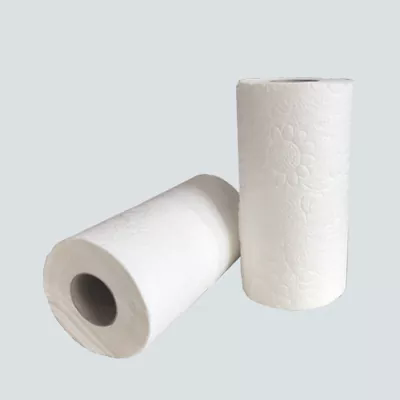What Defines Premium Finished Tissue for Modern Consumers?
2025-08-07
In today’s fast-paced world, finished tissue has evolved from a basic necessity to a product that reflects personal comfort, hygiene standards, and even lifestyle choices. From soft facial tissues that soothe sensitive skin to durable paper towels that tackle tough messes, finished tissue products are integral to daily routines in homes, offices, restaurants, and healthcare facilities. As consumers become more mindful of quality, sustainability, and safety, understanding the characteristics that set premium finished tissue apart is crucial. This guide explores what makes high-quality finished tissue essential, highlights key features to consider, provides detailed specifications of our top-tier products, and answers common questions to help consumers and businesses make informed decisions.
Trending News Headlines: Top Searches on Finished Tissue
- "How Ultra-Soft Finished Tissue Enhances Daily Comfort"
- "Finished Tissue Safety: Avoiding Harmful Chemicals"
These headlines underscore the priorities of modern consumers: sustainability, comfort, and safety. For households and businesses alike, choosing the right finished tissue is a decision that impacts daily experiences, hygiene practices, and environmental footprint.
Why Premium Finished Tissue Matters
Hygiene and Germ Prevention
The primary role of finished tissue is to maintain hygiene by effectively removing dirt, moisture, and germs. Premium finished tissue is engineered to perform this function without compromising on safety. For example, high-quality paper towels have superior absorbency, allowing them to quickly soak up spills and reduce the spread of bacteria in kitchens and bathrooms. Facial tissues that are soft yet strong prevent irritation while effectively capturing germs, making them ideal for use during cold and flu seasons. In healthcare settings, where hygiene is critical, premium finished tissue products are designed to meet strict standards, ensuring they do not leave lint or residue that could harbor pathogens. By choosing high-quality finished tissue, individuals and businesses can better protect themselves and others from illness.
Comfort and Skin Care
Finished tissue comes into direct contact with the skin, making comfort a key consideration. Premium products are designed to be gentle, even for those with sensitive skin. Ultra-soft facial tissues, for instance, are often infused with ingredients like aloe vera or vitamin E to soothe and moisturize, reducing redness and irritation caused by frequent use. Toilet paper with a plush texture and balanced ply count ensures comfort during daily use, avoiding the rough feel of low-quality alternatives. In commercial settings such as hotels and restaurants, offering premium finished tissue enhances the customer experience, showing a commitment to care and quality. Conversely, rough or thin tissue can cause discomfort, chafing, or even skin damage, detracting from daily well-being.
Durability and Cost Efficiency
While premium finished tissue may have a higher upfront cost, its durability often makes it more cost-effective in the long run. High-quality products are designed to be strong and resilient, meaning users need fewer sheets to achieve the desired result. For example, a single sheet of premium paper towel can absorb more liquid than multiple sheets of a cheaper brand, reducing overall usage and the frequency of replacements. Similarly, strong toilet paper resists tearing, preventing the need for excessive use and lowering waste. In commercial settings, this translates to fewer restocks, reduced labor costs, and less waste management—making premium finished tissue a smart investment for businesses looking to balance performance and budget.
Environmental Sustainability
As environmental awareness grows, consumers and businesses are increasingly seeking finished tissue products that minimize their ecological impact. Premium brands often prioritize sustainability through responsible sourcing, eco-friendly manufacturing processes, and recyclable packaging. For example, many high-quality finished tissue products are made from recycled materials or FSC-certified (Forest Stewardship Council) wood pulp, ensuring that trees are harvested responsibly and forests are preserved. Additionally, premium products are often manufactured using chlorine-free bleaching methods, which reduce harmful emissions and protect waterways. Biodegradable and septic-safe options further minimize environmental harm, ensuring that finished tissue breaks down naturally without clogging plumbing or polluting ecosystems. By choosing sustainable finished tissue, individuals and businesses can align their daily habits with their commitment to protecting the planet.
Safety and Compliance
Low-quality finished tissue may contain harmful substances such as chlorine bleach, fragrances, dyes, or formaldehyde, which can cause skin irritation, allergic reactions, or even long-term health issues. Premium finished tissue products, on the other hand, are manufactured to strict safety standards, using gentle, non-toxic ingredients. They undergo rigorous testing to ensure they are free from harmful chemicals, heavy metals, and bacteria, making them safe for use by all individuals, including children, the elderly, and those with sensitive skin or allergies. Many premium brands also avoid animal testing and use hypoallergenic formulas, further prioritizing safety. For businesses in industries such as healthcare, hospitality, and food service, using safe, compliant finished tissue is not only a matter of customer satisfaction but also a legal requirement to meet health and safety regulations.
Key Features of Premium Finished Tissue
Material Quality
The raw materials used in finished tissue directly impact its softness, strength, and sustainability. Premium products often use high-grade wood pulp—either virgin, recycled, or a blend of both. Virgin pulp, derived from sustainably managed forests, is known for its softness and strength, making it ideal for facial tissues and toilet paper. Recycled pulp, made from post-consumer waste, reduces environmental impact while still offering good performance, often used in paper towels and napkins. High-quality finished tissue also undergoes thorough processing to remove impurities, resulting in a smoother, more consistent texture.
Ply Count and Thickness
Ply count refers to the number of layers of tissue bonded together, and it plays a significant role in both strength and comfort. Higher ply counts (e.g., 2-ply or 3-ply) generally indicate greater durability and absorbency. For example, 3-ply facial tissues are thicker and more absorbent than 1-ply, providing better protection during sneezing or coughing. However, ply count alone does not determine quality; the thickness and density of each layer are also important. Premium finished tissue is engineered to balance ply count with thickness, ensuring it is strong enough for use without being overly bulky, which can cause issues with dispensers.
Absorbency
Absorbency is a critical feature, especially for paper towels and napkins. Premium finished tissue is designed with a porous structure that allows it to quickly soak up liquids, trapping them within the fibers to prevent dripping. This is achieved through advanced manufacturing techniques such as embossing, which creates air pockets that enhance absorbency. For toilet paper, absorbency must be balanced with dissolvability to ensure it does not clog plumbing systems—a key feature of high-quality products.
Softness
Softness is measured by the smoothness of the tissue’s surface and its ability to feel gentle against the skin. Premium finished tissue undergoes additional processing steps, such as calendering (a smoothing process), to reduce roughness. Some products also include natural additives like aloe vera, shea butter, or vitamin E to enhance softness and provide extra care for sensitive skin.
Sustainability Certifications
Eco-conscious consumers and businesses look for finished tissue products with recognized sustainability certifications. These include FSC certification for responsible sourcing, ECOLOGO for reduced environmental impact, and Green Seal for compliance with strict environmental standards. These certifications provide assurance that the product meets rigorous criteria for sustainability, from raw material sourcing to manufacturing and packaging.
Our Premium Finished Tissue Specifications
|
Feature
|
Luxury Facial Tissues (BR-FL200)
|
Heavy-Duty Paper Towels (BR-PH350)
|
Ultra-Soft Toilet Paper (BR-TU250)
|
|
Material
|
100% FSC-certified virgin pulp with aloe vera
|
70% recycled pulp + 30% virgin pulp
|
100% FSC-certified virgin pulp
|
|
Ply Count
|
3-ply
|
2-ply
|
3-ply
|
|
Sheet Size
|
20cm x 20cm
|
25cm x 30cm
|
11cm x 13cm
|
|
Sheets per Pack
|
200 sheets per box; 12 boxes per case
|
150 sheets per roll; 8 rolls per pack
|
250 sheets per roll; 10 rolls per pack
|
|
Softness Rating
|
10/10 (dermatologically tested)
|
7/10 (balanced strength and softness)
|
9/10 (consumer-tested comfort)
|
|
Absorbency
|
High (gentle absorption for facial use)
|
Excellent (absorbs 6x its weight in liquid)
|
High (quick absorption with fast dissolvability)
|
|
Strength
|
Strong yet soft; lint-free
|
High wet strength to resist tearing
|
Tear-resistant during use; septic-safe
|
|
Chemicals
|
Chlorine-free (oxygen bleached); contains aloe vera
|
Chlorine-free; dye-free; fragrance-free
|
Chlorine-free; fragrance-free
|
|
Sustainability
|
FSC certified; biodegradable; recyclable packaging
|
70% recycled content; FSC certified
|
FSC certified; carbon-neutral manufacturing
|
|
Certifications
|
FSC, Dermatologically Tested, ECOLOGO
|
FSC, Green Seal, Recycled Content Certified
|
FSC, ECOLOGO, Septic-Safe Certified
|
|
Recommended Use
|
Homes, offices, healthcare facilities, beauty salons
|
Restaurants, commercial kitchens, workshops
|
Homes, hotels, resorts, senior care facilities
|



